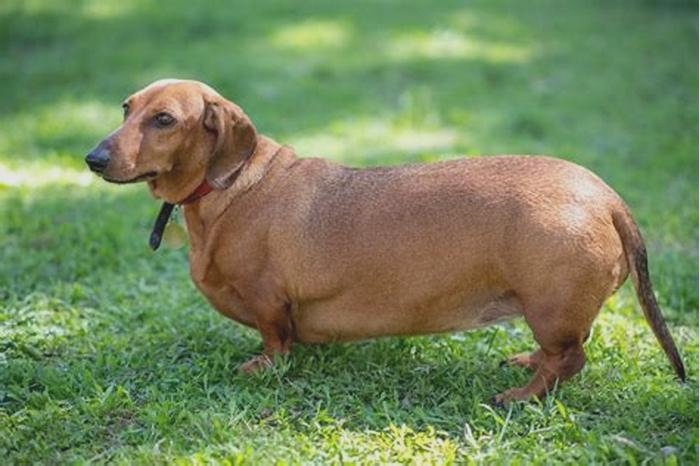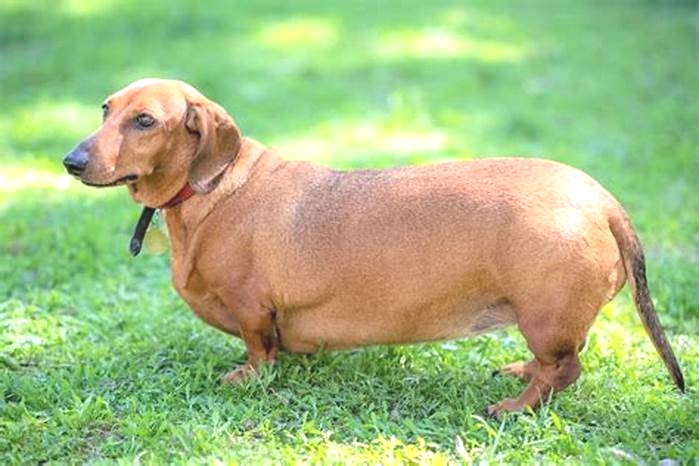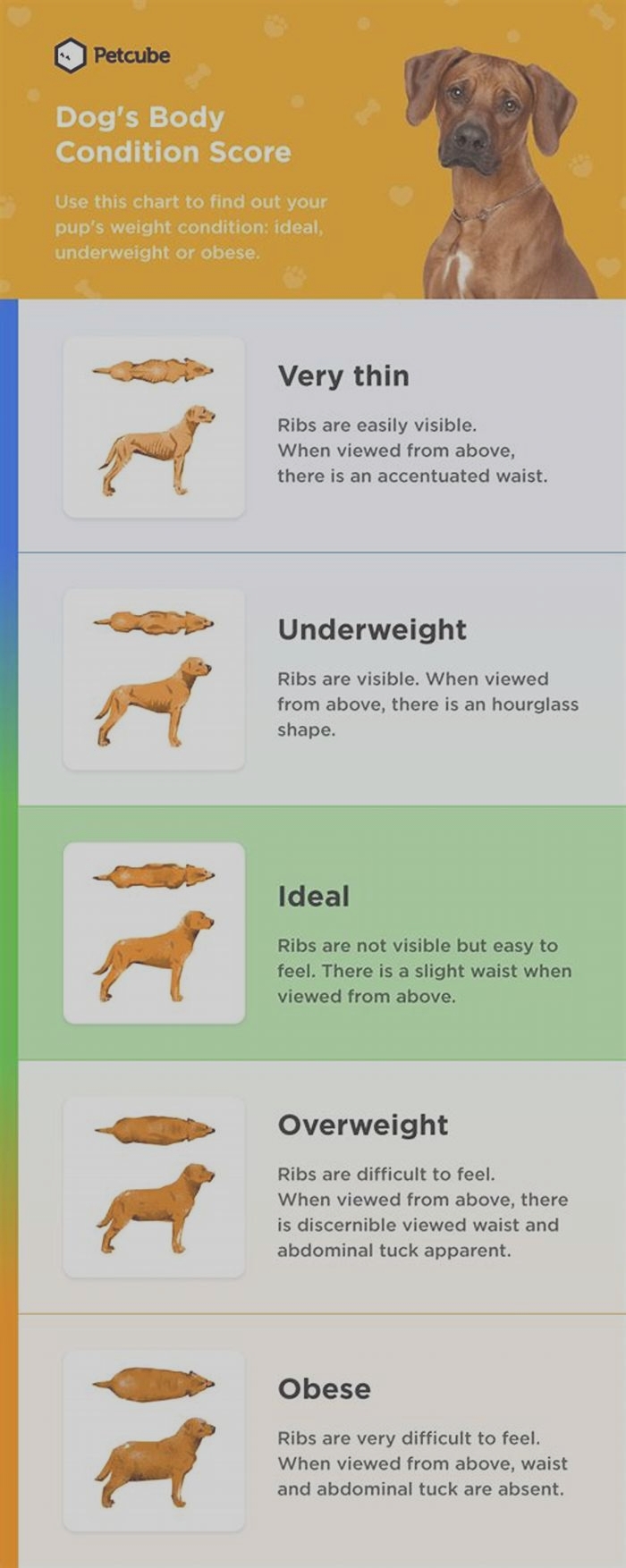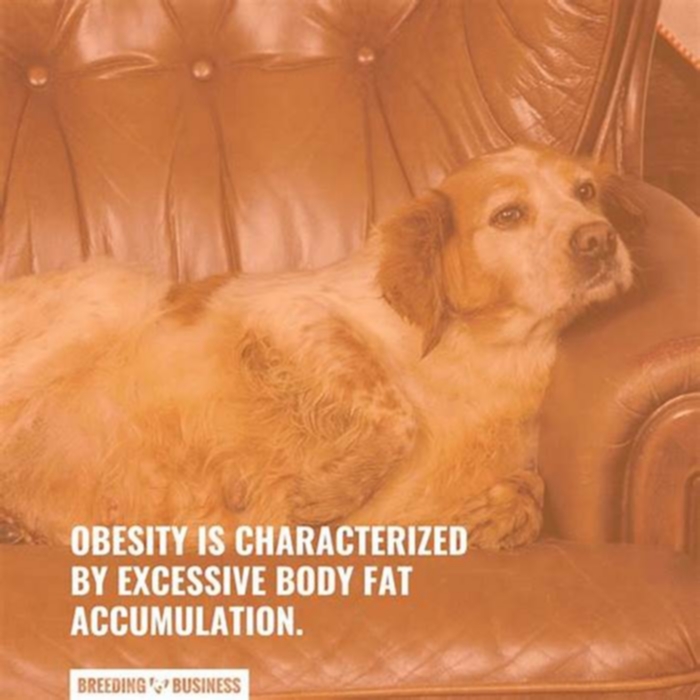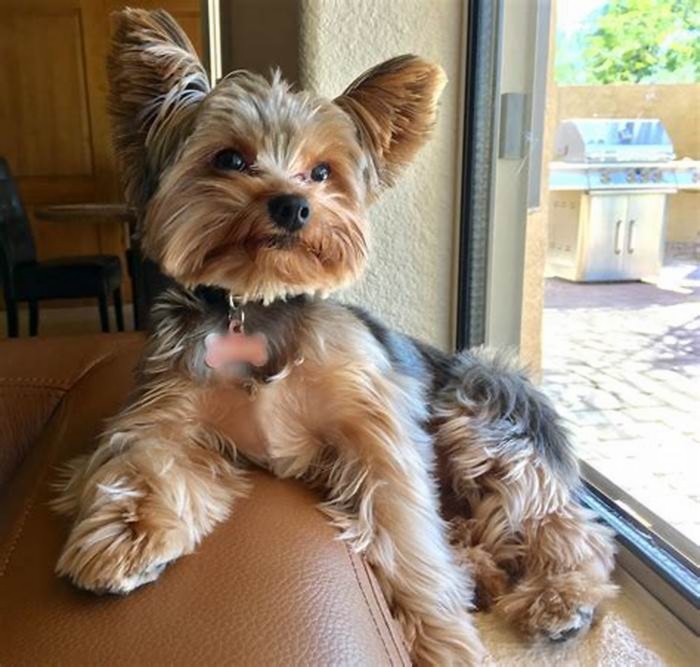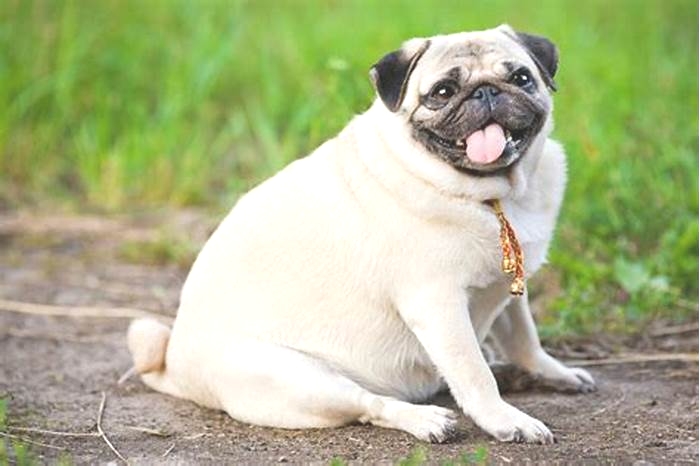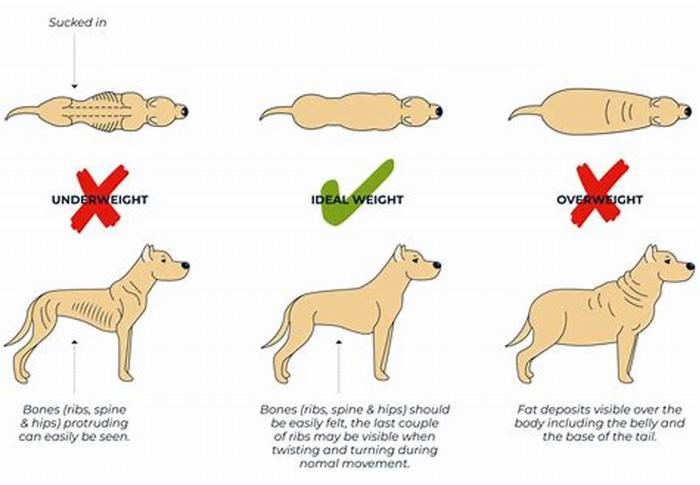How to Help Your Obese Dachshund Shed Pounds
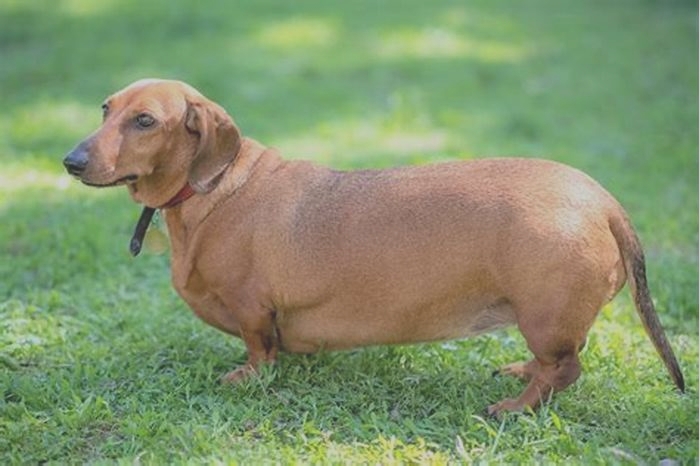
Is Your Dachshund Overweight?
Are you worried that your dachshund is overweight? Youre not alone. Many dachshund owners struggle with this issue. But dont worry, were here to help. In this post, well discuss the signs of obesity in dachshunds and offer some tips for helping your pup lose weight.
As a proud dachshund owner, its important to keep an eye on your dogs weight and make sure they dont get too chubby. An overweight dachshund can be at risk for several health problems, so its crucial to take steps to help them stay fit. This blog post will provide tips for keeping your dachshund at a healthy weight. So read on to learn more.
Is Your Dachshund Overweight?
Many pet parents dont realize that weight is also an important health concern for these dogs. Here are three signs that your dachshund may be overweight:
1. You cant feel your dogs ribs. A healthy dachshund should have a visible waist and their ribs should be easily felt when you run your hands over its sides. If you cant feel your dogs ribs, its a sign that they are carrying around too much weight.
2. Your dog is having trouble getting around. Dachshunds have long bodies and short legs, which can make it difficult for them to move around if they are carrying too much weight. If you notice your dog is having trouble getting up or down the stairs or seems to be out of breath after just a few minutes of playing, its a sign that they need to lose some weight.
3. You can see a noticeable change in your dogs body shape. Take a look at photos of your dachshund from when they were at a healthy weight and compare them to how they look now. If you notice that their belly is sagging or their back end seems to be getting wider, its a sign that they are carrying around too much weight.
If you notice any of these signs in your dachshund, its important to take action to help them lose weight. The good news is that there are several things you can do to help your dog slim down.
Related post:Why wont my dachshund lose weight?
When is a dachshund overweight?
A dachshund is considered overweight when its weight is more than 15% above the ideal weight for its size and body type. An obese Dachshund is more than 30% above the ideal weight. Dachshunds come in three coat types: smooth, wirehair, and longhair. All three types of dachshunds can be overweight or obese.
Obesity in dachshunds can lead to health problems such as joint problems, diabetes, and respiratory difficulties. Miniature dachshunds are also prone to developing obesity if they are overfed and dont get enough exercise.
How to Tell if Your Dachshund is Overweight
One of the most reliable ways to check if your dachshund is overweight is by simply observing its body. If you can no longer feel or see their ribs through their skin, then chances are, you have an overweight dachshund.
Overweight dachshunds will also have rolls of fat at the base of their tails, around their necks, and on their shoulders. You should also feel your dogs ribs. If you cant feel them, your dog is likely overweight.
Another way to tell if your dachshund is overweight is to look at them from above. You should be able to see a waist and their tummy should not be sagging.
Sometimes, the ideal weight of a breed can vary from one individual to another, mostly based on their size. If, for example, you have a dachshund that is bigger than the breed standard says, its normal weight will naturally be heavier than the average dachshund.
Of course, the best way to determine if your dachshund is overweight is to consult your veterinarian. They will be able to give you an ideal weight range for your dog based on its size, body type, and age.
Click here to see our pick of the best food for dachshunds
How do I know if my Dachshund is overweight?
This chart will help you know if your dachshund is overweight.
How Much Should a Dachshund Weigh?
Generally, a healthy weight for an adult dachshund is between 16 and 32 pounds.
If you notice the visual signs of obesity in your dog, then its probably a good idea to weigh them as soon as possible to confirm. According to theAmerican Kennel Club, standard Dachshunds should weigh no less than 16 pounds and no more than 32 pounds. For the miniature versions of the breed, they shouldnt be heavier than 11 pounds.
Of course, the standards given by the AKC may be a good place to start, but its not always reliable. As weve mentioned before, the ideal weight of a dachshund ultimately depends on its overall size. For example, while 30 pounds is lighter than what the AKCs set standard for the breeds maximum weight, some shorter dogs at 30 pounds may already be considered obese.
A dachshund should have a lean, muscular body, and should have a pronounced arch on its spine just behind the ribs. Their chest bones should also protrude somewhat. This is true both for standard dachshunds and for their miniature counterparts.
Should I be able to see my Dachshunds ribs?
Yes, you should be able to feel your dachshunds ribs. If you cant feel them, your dog is likely overweight. Another way to tell if your dachshund is overweight is to look at them from above. You should be able to see a waist and their tummy should not be sagging.
What are the health risks of an overweight Dachshund?
Dachshunds who are overweight or obese are at increased risk for health problems such as joint problems, diabetes, and respiratory difficulties. Joint problems are the most common health problem associated with obesity in dachshunds.
Obesity puts extra strain on the joints which can lead to pain and degenerative joint diseases such as arthritis. Diabetes is another serious health concern for obese dachshunds.
Obese dachshunds have a higher chance of developing diabetes. Obesity makes it more difficult for the body to regulate blood sugar levels which can lead to diabetes. Respiratory difficulties can also occur in obese dachshunds due to the extra weight putting strain on the chest and lungs.
What do I do if my Dachshund is overweight?
If your dachshund is overweight, you will need to help him lose weight. The first step is to consult your veterinarian. They can help you develop a weight loss plan for your dog that is safe and effective.
This plan may include changes to your dogs diet and exercise routine. You should also monitor your dogs weight closely to make sure they are losing weight safely.
You should also monitor your dogs weight closely to make sure they are losing weight safely. Do not try to crash diet your dog as this can be dangerous.
With a little time and effort, you can help your overweight dachshund slim down and enjoy a healthier life.
How can I help my overweight Dachshund lose weight?
When it comes to weight loss for dachshunds, the process is similar to that for humans. You can achieve it by either reducing your calorie intake or increasing your physical activity to burn more calories.
This can be accomplished through a combination of diet and exercise. Its important to note that the most effective approach involves both methods. If your dachshund is overweight, there are steps you can take to help them lose weight. Here are some tips to consider.
Offer Dog Food with Lesser Calories
One of the most effective ways to help an overweight dachshund lose weight is to simply lower the number of calories theyre eating daily. Put simply, calories are the energy we get from food, which is then burned off as we go about our daily activities.
Calories that arent burnt off are stored as fat. So, by that logic, a good way to lower your dachshunds weight is to limit their calorie intake to make sure that any calories they do eat are burned off, even with minimal exercise.
Now, a standard dachshund requires 230 500 calories a day, whilst the miniature ones require 160 220 calories a day. Make sure you dont go over this daily calorie requirement.
Of course, it wouldnt make sense to just give your dog their entire days calorie requirement in one go. Youll need to divide their daily calorie needs by the number of meals they eat a day. For example, if youre feeding your dachshund twice a day, then you shouldnt give them more than 250 calories of food per meal.
A good way to control the number of calories per meal is to simply choose a dog food that has fewer calories per serving. This means you can give more volume of food but arent contributing too many calories per meal.
Your dog will feel full every time they eat, but theyre storing less fat and will be losing weight.
Exercise your dachshund regularly
Of course, changing up the diet for an overweight dachshund isnt enough, you need to help your pet burn off any excess calories. You can do this by simply giving your dog plenty of exercise.
Now, dachshunds, by their very nature, are an energetic breed, so keeping them active isnt that hard. They already love doing it.
Start by giving your dog their daily walks. Your dachshund needs to walk at least half an hour a day. Playing with your dog can also help him lose weight.
Read more about the Dachshund diet and exercise
Avoid Extra Calories from Treats
Another source of unnecessary calories is dog treats. Now, treats are a good way to help train your dog. They can be used as incentives to encourage good behavior.
Unfortunately, a lot of people end up overdoing it, which leads to adding extra calories. Although its not a good idea to remove treats entirely from the menu, its a good idea to look for alternatives for training incentives.
These alternatives can be in the form of their favorite toy. It can also be an enrichment item, like a ball that you can stuff with treats.
This may sound counter-intuitive, but such a toy can force your dog to do a bit of problem-solving and a bit of exercise for one of those treats. When it comes to treats, much like everything else in a diet for an overweight dachshund, moderation is the key.
Use Slow Feeder Bowls
An overweight dachshund can be a voracious eater, and if given the chance, will consume its entire meal in a blink of an eye. You will need to encourage your dog to slow down while they eat.
Otherwise, they can end up with bloat, or worse, choking. Slowing down your dachshunds eating habits will also help prevent indigestion and will help them feel full for much longer, hence lowering their urge to find food. Here you will find our favorite slow feeder. It is available on Amazon.
Keep up with Vet Check-ups
One of the best ways to help keep your dog in the best shape is by keeping up with your vet visits. Some of the problems with overweight dachshunds arent caused by overfeeding or the lack of exercise.
Rather, your dogs weight problems may just be the effect of an underlying illness, particularly those connected to metabolism. Visiting your vet can help determine whether this is indeed the problem.
At the very least, visiting a vet regularly can give you plenty of much-needed information on how to help maintain your dogs overall health.
Related post:Common Dachshund Health Issues To Be Aware Of
What is overweight for a mini Dachshund?
The ideal weight for a mini dachshund is between 6 and 11 pounds. If your mini dachshund weighs more than this, they are considered overweight. Obesity in mini dachshunds can lead to the same health problems as obesity in standard dachshunds, such as joint problems, diabetes, and respiratory difficulties.
If you think your mini dachshund is overweight, the first step is to consult your veterinarian. They can help you develop a weight loss plan for your dog that is safe and effective. This plan may include changes to your dogs diet and exercise routine.
You should also monitor your dogs weight closely to make sure they are losing weight safely. Do not try to crash diet your dog as this can be dangerous. With a little time and effort, you can help your mini dachshund slim down and enjoy a healthier life.
Is Obesity Common in Dachshunds?
Just like many smaller dog breeds, dachshunds are much easier to overfeed and are hence more prone to being overweight. They have lesser daily calorie needs, so the margin for error when feeding them is relatively small.
Not only that, but theyre also very food-motivated and will tend to eat a lot when presented with food, even when theyre not at all hungry. Of course, one advantage for dachshunds is that theyre a very active breed. If given the time and the chance, they will prefer to run around.
Dangers of Obesity for Dachshunds
Dachshunds are bred to be very tenacious and somewhat resilient, despite their small size. Despite this, however, they are prone to a lot of health issues, particularly with their spine, given their long and low body profile.
At least a quarter of all dachshunds will develop an intervertebral disk disease as they grow older, and the added pressure of any extra weight on their spine can make them more susceptible to such a disease.
Conditioning your dachshund through regular exercise and watching its weight closely can help mitigate a lot of these problems.
Another issue youll need to look out for with an overweight dachshund is blood sugar-related health issues, particularly glaucoma, and diabetes. Glaucoma in particular can be dangerous, as it affects the dogs vision.
It is hereditary, however, so if you can track down your dogs family medical history, you can discern whether theyre at risk for this disease. You can then easily prevent this through a proper diet.
Related Post:How to Prevent Dachshund Back Problems
Final thoughts
Obesity is a real problem for dachshunds, but with a good diet and plenty of exercise, you can help your dog stay healthy and happy. We hope this post has helped educate you on the causes of obesity in dachshunds and given you some ideas about how to prevent it. Thanks for reading!
If you want to find the best pet insurance for your dachshund, click here
Sources:

